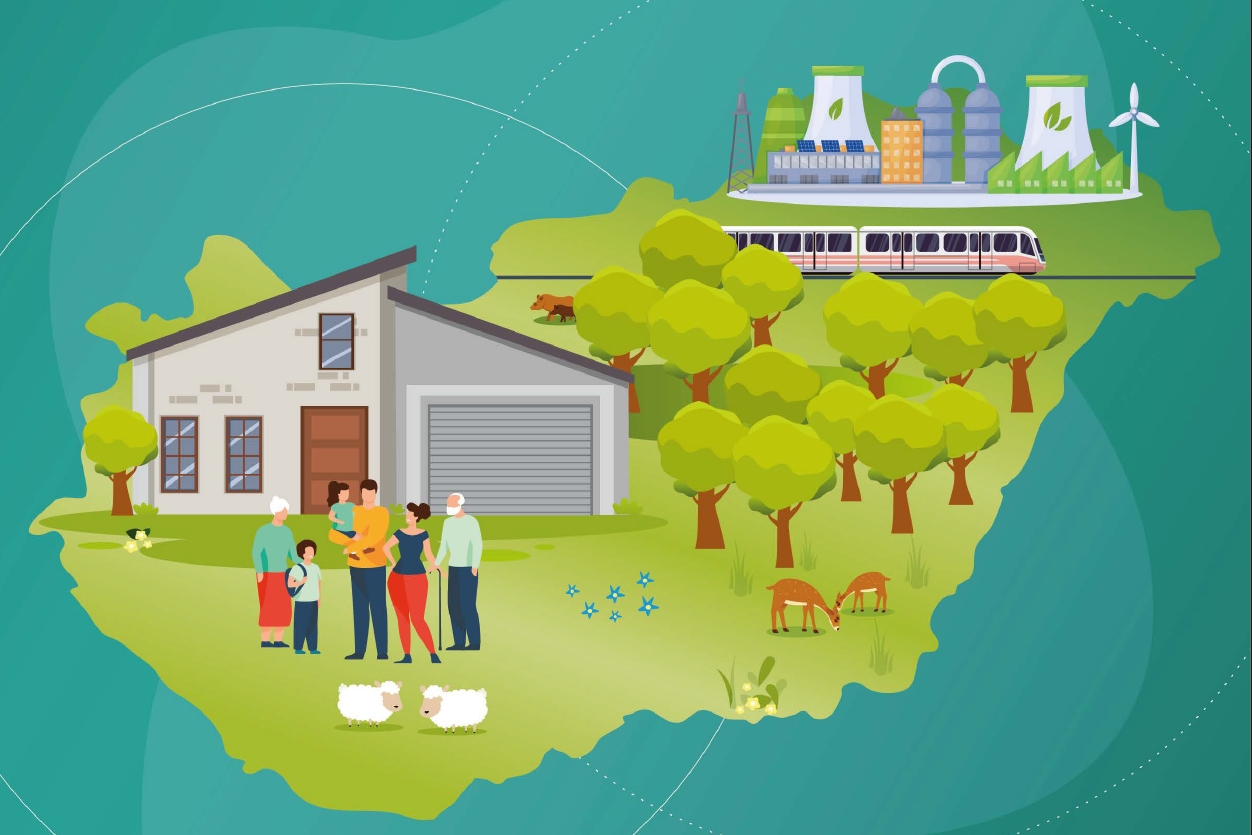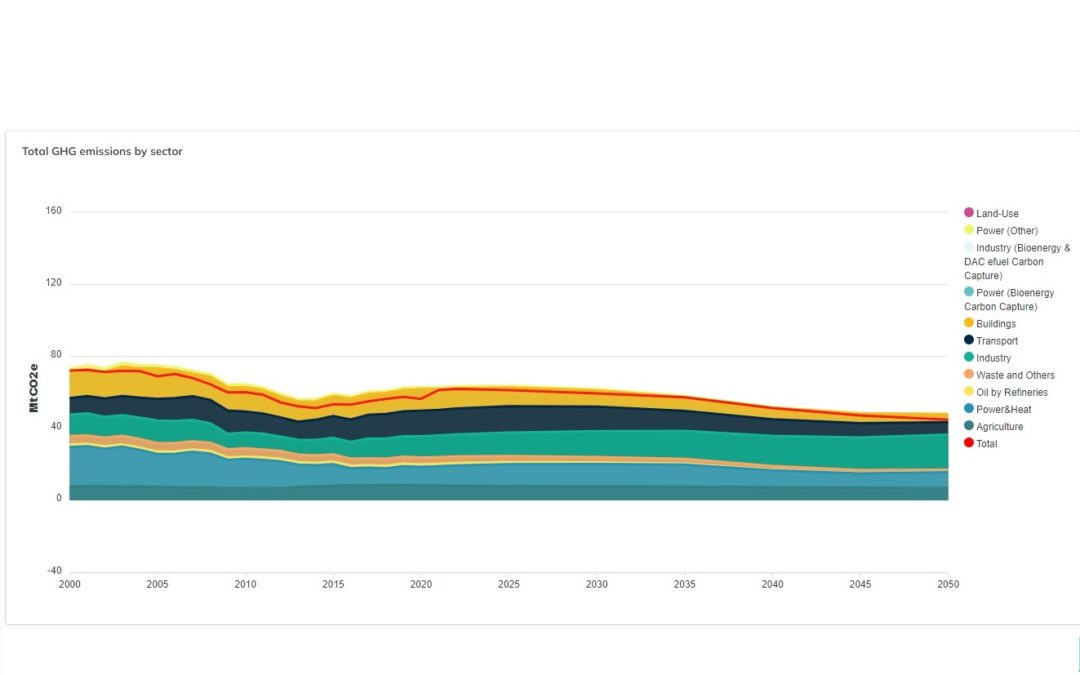The Green Policy Center, under the umbrella of the MIRROR project, aims to help Hungary prepare for the 2023 review of its National Energy and Climate Plan with modelling-based proposals. Below is a list of key messages and proposed targets for Hungary and sectoral policy proposals.
Key messages and proposed targets
1) The investments already planned with EU funds in the period 2021-2027 and the market-based interventions resulting from high energy and carbon quota prices will allow Hungary to reach its 2030 emissions target in force today. However, the country would not even come close to the 2050 climate neutrality target if it were to follow this path. In other words, the current medium-term 2030 target does not ensure that we will reach the long-term target we have set ourselves, and we need to raise this 2030 target.
2) The current domestic renewable energy target for 2030 appears to be in doubt, while the energy efficiency target is likely to be missed. Thus, further steps and policy interventions are certainly needed in these areas.
3) In light of the EU’s increased 2030 target, we modeled the impact of these new expectations on Hungary. This predicts a much more robust climate policy-led trajectory, with much faster progress until 2030 than currently envisaged. With the increased ambition levels for 2030, the 2050 climate neutrality target can be achieved on a more balanced path.
4) The new EU provisions on energy efficiency and renewable energy have the strongest impact on Hungary’s emissions reduction path.
5) In terms of funding, there is an estimated HUF 10,600 billion of uncommitted EU and domestic resources available for climate action for the period 2023-2030. The efficient use of these funds for long-term climate goals is a key national strategic issue and a unique opportunity not only for climate policy but also for the long-term sustainable social and economic functioning of our country.
Based on our analysis, we propose to commit to and meet the following national targets in the updated National Energy and Climate Plan:
– 60% net reduction of greenhouse gas emissions by 2030 compared to 1990
– 85% net reduction by 2040, also compared to 1990
– 30% share of renewable energy in final energy consumption in Hungary,
– a 6.5% energy efficiency improvement in Hungary’s final energy consumption compared to the EU 2020 reference scenario.
Achieving the emissions reduction target at the economy-wide level is greatly helped by setting sub-targets at sectoral or other levels. This also has the advantage of making it clearer to individual actors what their roles and responsibilities are in achieving the common target. Work should therefore continue in this direction.
Achieving these targets is realistically achievable even with increasing industrial production, although it will undoubtedly require considerable effort and commitment. However, our past results, the high level of social support for the 2050 climate neutrality target (93.6%), the associated benefits of the necessary interventions (energy sovereignty, improved quality of life, preservation of natural assets, etc.) and the need for our country to operate in a sustainable and climate resilient manner in the long term provide a good basis for doing so. Below is a summary of the key actions proposed by the Green Policy Center.

42 proposals to meet the increased 2030 Hungarian climate targets
7 proposals to make the building sector more sustainable:
1) We need to create the domestic manufacturing capacity, design and construction specialist base for the materials and equipment needed for the mass renovation of the building stock!
2) New buildings will not solve the problem, those that can still be saved should be renovated using sustainable and environmentally friendly materials and processes!
3) Price control of household energy prices: maintain an investment-incentive price environment for large consumers!
4) Without state support, it is impossible to achieve the necessary renovation rate, long-term support programmes must be launched!
5) More stringent energy efficiency requirements for new houses!
6) All sustainable solutions should be used to ensure sustainable energy supply in buildings!
7) Information and regulation should be used to influence consumer and investor behaviour in relation to energy efficiency.
7 proposals to make the transport sector more sustainable:
1) More opportunities for teleworking and home-based services are needed, so as a more thoughtful urban development!
2) Encourage a shift to public transport and active modes of transport (modal shift)!
3) Fewer cars with higher occupancy rates!
4) Greener cars and public transport vehicles are needed!
5) Reduce freight transport demand and distances!
6) Reduce the share of road freight transport!
7) Low-emission vehicles for freight transport should be introduced!
7 proposals to make agriculture and forestry, bioenergy production, waste management more sustainable:
1) Increase bioenergy production, especially biomethane, with market regulations!
2) Plant much more trees, of species more resistant to the negative effects of climate change!
3) Encourage the reduction of food waste!
4) Encourage healthier and more climate-friendly eating habits, locally produced and seasonal products!
5) Promote greening of agricultural energy use!
6) Help agriculture adapt to a changing climate!
7) Accelerate progress towards a circular economy!
7 proposals to make small industrial and energy production installations more sustainable:
1) Strengthen the energy efficiency obligation scheme!
2) Support the financing of industrial energy transition investments by SMEs!
3) Climate protection agreements should be concluded with industrial sectors!
4) Coordinated and rapid development of the electricity grid, solar and wind energy is needed!
5) Accelerate the Green District Heating Programme!
6) Ban new consumers from connecting to the gas grid to reduce dependence on natural gas!
7) Eliminate fugitive emissions from the extraction and transportation of natural gas and oil!
7 proposals to make large domestic emitters more sustainable:
1) Maintain the EU ETS system which limit the biggest polluters!
2) Keep at the forefront of innovative technologies!
3) Create the external conditions necessary for the technological transformation of large industrial emitters!
4) Support the domestic uptake of innovative, sustainable manufacturing technologies!
5) When designing new industrial installations or those undergoing major refurbishment, it should be mandatory to consider the possibilities for further green development!
6) Green solutions for power and heat generation, oil refining and natural gas systems should be adopted.
7) Restrict short-haul passenger air traffic and the use of private jets!
7 proposals for using EU and national funds for climate action:
1) Use available resources for climate and energy in a well thought-out, efficient and predictable way, with proper monitoring!
2) The Hungarian national budget should continue to make a significant contribution to climate goals!
3) When planning RRF loans and REPowerEU funds, focus as much as possible on energy-saving climate-friendly solutions instead of fossil investments!
4) Speed up the absorption of EU funds already available!
5) Increase the use of direct EU funds!
6) Simplicity, professionalism and a holistic approach should be encouraged in the development of calls for proposals.
7) Increase transparency in the spending of green funds!
A partial set of proposals is available on the Green Policy Center website (in Hungarian):



